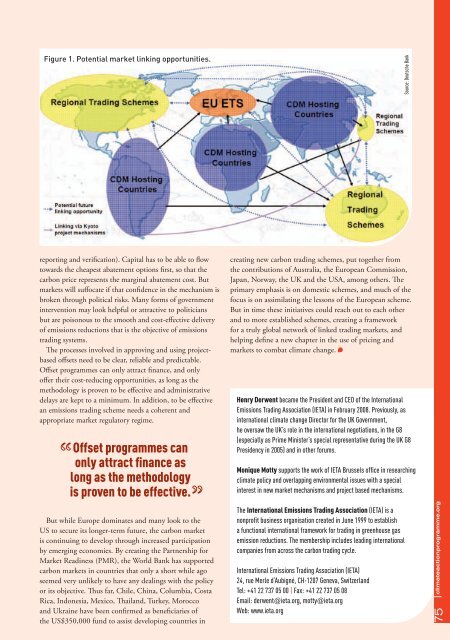Climate Action 2011-2012
Create successful ePaper yourself
Turn your PDF publications into a flip-book with our unique Google optimized e-Paper software.
Figure 1. Potential market linking opportunities.<br />
Source: Deutsche Bank<br />
reporting and verification). Capital has to be able to flow<br />
towards the cheapest abatement options first, so that the<br />
carbon price represents the marginal abatement cost. But<br />
markets will suffocate if that confidence in the mechanism is<br />
broken through political risks. Many forms of government<br />
intervention may look helpful or attractive to politicians<br />
but are poisonous to the smooth and cost-effective delivery<br />
of emissions reductions that is the objective of emissions<br />
trading systems.<br />
The processes involved in approving and using projectbased<br />
offsets need to be clear, reliable and predictable.<br />
Offset programmes can only attract finance, and only<br />
offer their cost-reducing opportunities, as long as the<br />
methodology is proven to be effective and administrative<br />
delays are kept to a minimum. In addition, to be effective<br />
an emissions trading scheme needs a coherent and<br />
appropriate market regulatory regime.<br />
Offset programmes can<br />
only attract finance as<br />
long as the methodology<br />
is proven to be effective.<br />
But while Europe dominates and many look to the<br />
US to secure its longer-term future, the carbon market<br />
is continuing to develop through increased participation<br />
by emerging economies. By creating the Partnership for<br />
Market Readiness (PMR), the World Bank has supported<br />
carbon markets in countries that only a short while ago<br />
seemed very unlikely to have any dealings with the policy<br />
or its objective. Thus far, Chile, China, Columbia, Costa<br />
Rica, Indonesia, Mexico, Thailand, Turkey, Morocco<br />
and Ukraine have been confirmed as beneficiaries of<br />
the US$350,000 fund to assist developing countries in<br />
creating new carbon trading schemes, put together from<br />
the contributions of Australia, the European Commission,<br />
Japan, Norway, the UK and the USA, among others. The<br />
primary emphasis is on domestic schemes, and much of the<br />
focus is on assimilating the lessons of the European scheme.<br />
But in time these initiatives could reach out to each other<br />
and to more established schemes, creating a framework<br />
for a truly global network of linked trading markets, and<br />
helping define a new chapter in the use of pricing and<br />
markets to combat climate change.<br />
Henry Derwent became the President and CEO of the International<br />
Emissions Trading Association (IETA) in February 2008. Previously, as<br />
international climate change Director for the UK Government,<br />
he oversaw the UK’s role in the international negotiations, in the G8<br />
(especially as Prime Minister’s special representative during the UK G8<br />
Presidency in 2005) and in other forums.<br />
Monique Motty supports the work of IETA Brussels office in researching<br />
climate policy and overlapping environmental issues with a special<br />
interest in new market mechanisms and project based mechanisms.<br />
The International Emissions Trading Association (IETA) is a<br />
nonprofit business organisation created in June 1999 to establish<br />
a functional international framework for trading in greenhouse gas<br />
emission reductions. The membership includes leading international<br />
companies from across the carbon trading cycle.<br />
International Emissions Trading Association (IETA)<br />
24, rue Merle d’Aubigné, CH-1207 Geneva, Switzerland<br />
Tel: +41 22 737 05 00 | Fax: +41 22 737 05 08<br />
Email: derwent@ieta.org, motty@ieta.org<br />
Web: www.ieta.org<br />
75 climateactionprogramme.org












